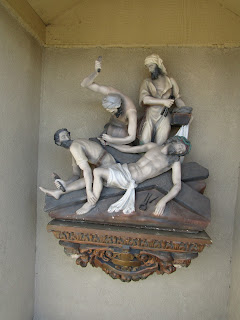Scripture readings: 1
Peter 5:1-4; John 21:1-19
 |
| On a Walk by the Columbia River, Mattawa/Desert Aire, WA April 24, 2017 |
When you get to the end of
Chapter Twenty, in the Gospel of John, it sounds like John is bringing his writing
to an end. Then he starts Chapter Twenty-One and he brings it to an end, for a
second time, with these words: “Jesus did many other things as well. If every
one of them were written down, I suppose that even the whole world would not
have room for the books that would be written.” (John 21:25)
I think that’s why John
couldn’t quite bring himself to stop. There was so much to say about Jesus. I
also think that’s the reason why, when you read about Jesus rising from the
dead, in all four gospels, they don’t tell us any of the same things, except
that the tomb was empty. There is always too much to say when Jesus is doing
something.
In the twentieth chapter,
Jesus teaches us about the power of his rising from the dead, and how this
power works for our peace, and for our own forgiveness, and for our giving
forgiveness to others. It tells us how his rising from the dead gives Jesus the
power for sending us (making us sent people; people with a mission like the
mission of Jesus).
In the twenty-first
chapter, Jesus gives us a demonstration of how his rising from the dead gives
him power to be the good shepherd, even after he lays down his life for his
sheep. His rising from the dead also gives him the power to make us shepherds like
him, if we love him.
 Part of our church’s
ordination vows (both for pastor’s and elders) is a promise to submit to the
scriptures of the Old and New Testaments as “God’s word to you.” I have to
submit to them as God’s word to me and, if you became a minister or an elder,
you would need to vow to accept them as God’s word to you. But, if you’re not
what we call “ordained”, that doesn’t let you off the hook.
Part of our church’s
ordination vows (both for pastor’s and elders) is a promise to submit to the
scriptures of the Old and New Testaments as “God’s word to you.” I have to
submit to them as God’s word to me and, if you became a minister or an elder,
you would need to vow to accept them as God’s word to you. But, if you’re not
what we call “ordained”, that doesn’t let you off the hook.
Besides, our church holds
the belief that all of us are ministers. Minister is an old word that means
servant. So we are all servants of Jesus, the chief servant, and servants of
each other, and servants of the gospel to the world, and servants of everyone
out there.
Peter writes, in his
second letter, describing himself as an elder and (as such) he addresses his
fellow elders, and calls them shepherds. Here, again, you’re not off the hook,
you are all shepherds.
When I say that I’m a pastor,
pastor is simply a fancy old word meaning shepherd. When I say that I’m a
pastor, you shouldn’t quite believe it, because it isn’t exactly true. It’s
more correct to say that I am an under-shepherd to the head-shepherd Jesus.
You are shepherds, too. You
are not shepherds under me. You are under-shepherds just like me, because you
and I serve together under Jesus, the head shepherd.
 Also, we are not only
shepherds to the church and our brothers and sisters in Jesus. Jesus once
described his job this way: “For the Son of Man (Jesus) came to seek and to
save the lost.” (Luke 19:10) So we’re shepherds to everybody.
Also, we are not only
shepherds to the church and our brothers and sisters in Jesus. Jesus once
described his job this way: “For the Son of Man (Jesus) came to seek and to
save the lost.” (Luke 19:10) So we’re shepherds to everybody.
Oddly enough, this is the
very thing we see Jesus doing in the twenty-first chapter of John. The disciples
(bless them) had managed, in just the few days since Jesus rose from the dead,
to get themselves lost again: not lost from him or from the Father, but from
themselves and from their purpose in life.
In the Gospel of Matthew,
Jesus gave instructions for the disciples to leave Jerusalem, for a while, and
go north, back to their home places in Galilee. The instructions were that they
would see Jesus there. (Matthew 28:10)
Someone remarked that,
after the resurrection, none of the disciples ever went searching for Jesus. He
always came in search of them.
Of course, they wouldn’t even
have known where to look, would they? If they went to Jesus’ house in
Capernaum, looking for him there, the gospels don’t tell us, but we’ve already
noticed that there is way too much to tell.
 They went to Galilee, not
knowing what to do next. They decided to go fishing, instead. At least that was
something they knew how to do, and they might make a few bucks while they were
at it.
They went to Galilee, not
knowing what to do next. They decided to go fishing, instead. At least that was
something they knew how to do, and they might make a few bucks while they were
at it.
It was their old way of
life. They grew up with it. It felt good. Or it would have felt good, if they
had caught anything.
Well they knew all about
that, too. Just because you know what you’re doing doesn’t mean it will go
well. And they were dealing with nature: with fish and with weather. With our
orchards in bloom and our freezing spring nights, I’ve been praying for the
farmers. They know what they’re doing, and yet who knows what will happen by
the time harvest comes around again. It’s the same with fishing.
The disciples didn’t know
how to look for Jesus. They were wandering. They were on auto-pilot. Yesterday,
I heard the pastor at Bill Siegfried’s memorial service, talking about the
disciples, after Jesus rose from the dead, being “stuck” in the past. I’ve been
reading the same thing all this past week, so it must be important for you and
me to get unstuck.
The funny thing, here, is
that Jesus takes those disciples back in time, in order to unstick them. In the
Gospel of Luke (Luke 5:1-11) you can read about the first time, or so, when Jesus
found Peter and his friends.
 It was almost the same. They
had been fishing all night and they hadn’t caught a thing. Jesus told them to
go out again and, that time (again), they caught so many fish that they needed
another boat to come out to help them haul the net.
It was almost the same. They
had been fishing all night and they hadn’t caught a thing. Jesus told them to
go out again and, that time (again), they caught so many fish that they needed
another boat to come out to help them haul the net.
Even after Jesus rose from
the dead, Peter and his friends had to learn the same old lessons. Both times,
they were lessons about themselves. Both times, they were lessons about Jesus
being up to the task of taking care of them, and providing for them, and leading
them.
In the twentieth chapter
of John, Jesus said to them “Peace be to you.” (John 20:19,21) He actually said
it twice in close sequence. This time Jesus said to Peter, “Do you love me?”
and he repeated the question three times.
The disciples had all
deserted Jesus when he was arrested, and Peter had (three times) denied even knowing
Jesus. The offering of peace and the question of love may have had something to
do with their guilt, shame, sin, and regret. They had all gone through
something terrible, and they had all responded badly, and they were lingering
over it. They had gotten stuck.
Jesus never mentions their
guilt, shame, sin, and regret. He never names them. But Jesus shepherds the
disciples in their stuckness.
Jesus repeats his lessons
willingly. They don’t look for this. They don’t expect this, themselves. Jesus is
the one who knows better, and so he looks for this, and he works it out, again
and again.
 He repeats himself a lot with
you and me; and, boy, do we need it. If this is God’s word to you, then it’s
your job and mine to do this (to repeat the same things) for each other, and
for those who don’t really know much about Jesus and who aren’t even looking
for him. We are willing to repeat the same things over and over, because we
know what it’s like to not be looking for Jesus, because the word of God teaches
us that we aren’t.
He repeats himself a lot with
you and me; and, boy, do we need it. If this is God’s word to you, then it’s
your job and mine to do this (to repeat the same things) for each other, and
for those who don’t really know much about Jesus and who aren’t even looking
for him. We are willing to repeat the same things over and over, because we
know what it’s like to not be looking for Jesus, because the word of God teaches
us that we aren’t.
Also, it teaches us that
we can be creative, like Jesus. It’s hard to talk about sin. Jesus, at this
point, wasn’t saying anything about sin; or about any such things. All he did
was talk to them about peace, and love, and taking care of others. We can do
the same.
Maybe, like Peter and his
friends, we are not only dealing with guilt, shame, sin, and regret. Maybe it
was (and is) simply discouragement. So, Jesus teaches us about his ability to
find us, take care of us, and feed us, so that we can be shepherds to the
discouraged.
We can be shepherds of
encouragement. We need it ourselves, and so does everyone else.
One of the secrets of
getting unstuck is to not hold so tight to the past and its patterns. “Do you
love me?” “Feed my sheep.” “Follow me.” These are not about the past. These are
about the present, and the future.
 I get awfully stuck in the
past. It’s one of my sins. I try to focus on what God wants me to do next. I
make lists of things to do, and people to think about, days ahead of time. I
have a sticker on my prayer wall that says, “Next Thing.” I need even better
reminders than that.
I get awfully stuck in the
past. It’s one of my sins. I try to focus on what God wants me to do next. I
make lists of things to do, and people to think about, days ahead of time. I
have a sticker on my prayer wall that says, “Next Thing.” I need even better
reminders than that.
The Gospel of John ends on
a note where Jesus says, “Let me get you unstuck, so that you can follow me.”
This is his command to every disciple, including you and me.
It’s his command to every
church, including this one. We are commanded to come unstuck, because Jesus has
died to make this possible; and Jesus has risen from the dead to make this
possible. So, anything is possible. All things are possible. And Jesus says the
words you’ve heard him say many times: “Do you love me? Feed my sheep. Follow
me.”





























